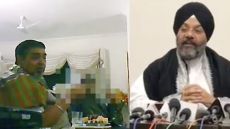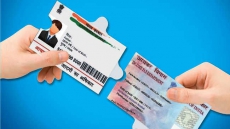The Supreme Court today sought assistance of Attorney General K K Venugopal in dealing with a plea seeking that minority communities be defined on the basis of state-wise population data instead of national data.
A bench comprising Chief Justice Ranjan Gogoi and Justices Deepak Gupta and Aniruddha Bose took note of the submissions of senior advocate Mukul Rohatgi that the law which allows declaration of minority community on the basis of national data was illegal.
The bench asked BJP leader and lawyer Ashwini Kumar Upadhyay, who has filed a public interest litigation (PIL) on the issue, to supply a copy of the petition to the office of the attorney general and listed it for hearing after four weeks.
The plea has challenged the validity of the Centre's 26-year-old notification declaring five communities -- Muslims, Christians, Sikhs, Buddhists and Parsis -- as minorities.
It has sought to declare as unconstitutional the section of National Commission for Minority (NCM) Act, 1992, under which the notification was issued on October 23, 1993.
Ashwini Kumar Upadhyay has sought direction for laying down guidelines to define the term minority'', based on state-wise population of a community instead of the national average.
He has contended in the plea that the notification was violative of fundamental rights to health, education, shelter and livelihood.
The advocate said he was filing the public interest litigation (PIL) on the issue as he did not receive any response on his representation from the Home Ministry, the Ministry of Law and Justice and the National Commission for Minorities.
Mr Upadhyay filed fresh petition as the apex court, on his petition, on February 11 had asked him to approach the NCM, with the direction that it will decide within three months his representation which sought laying down of guidelines for defining the term "minority" based on state-wise population of a community instead of the national average.
In his petition, the BJP leader has said Hindus, who are a majority community as per national data, are a minority in several north-eastern states and in Jammu and Kashmir.
However, the Hindu community is deprived of benefits which are available to the minority communities in these states, the plea has said, adding that NCM should reconsider the definition of minority in this context.
The definition of "minority" as per Article 29-30 has left leakages in the hands of state, which shall be misused and are being misused for political benefits, the petition said, adding that the minority status be granted to Hindus in states where the number of the community has decreased.
The plea has sought minority status for Hindus in seven states and one Union Territory where the number of the community has fallen, according to the Census 2011.
It has stated that as per 2011 Census, Hindus are minority in eight states -- Lakshadweep (2.5 per cent), Mizoram (2.75 per cent), Nagaland (8.75 per cent), Meghalaya (11.53 per cent), Jammu and Kashmir (28.44 per cent), Arunachal Pradesh (29 per cent), Manipur (31.39 per cent) and Punjab (38.40 per cent).
It has stated that Christians are in majority in Mizoram, Meghalaya and Nagaland and there is significant population in Arunachal Pradesh, Goa, Kerala, Manipur, Tamil Nadu and West Bengal but they are treated as minority.
Likewise, Sikhs are a majority in Punjab and there is a significant population in Delhi, Chandigarh and Haryana but they are treated as a minority, it has said.
Muslims are a majority in Lakshadweep (96.20 per cent), Jammu and Kashmir (68.30 per cent) and there is a significant population of the community in Assam (34.20 per cent), West Bengal (27.5 per cent), Kerala (26.60 per cent), Uttar Pradesh (19.30 per cent) and Bihar (18 per cent).
However, they are enjoying "minority" status, and communities, which are real minorities, are not getting their legitimate share, jeopardizing their basic rights guaranteed under the Articles 14, 15, 19 and 21 of the Constitution, the petition has said.


